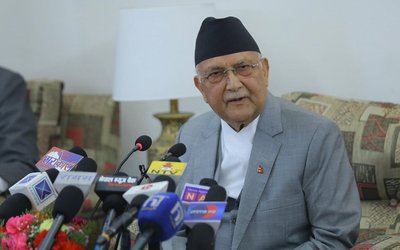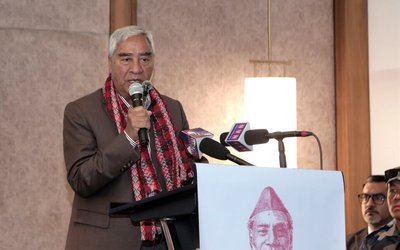
Although Kanchanpur Village Development Committee of Saptari district is very close to the East-west highway, which links it with the rest of Nepal, the child malnutrition scenario remains bleak or similar as a number of children are suffering from Acute Malnutrition in the village.
Known as self-sufficient in food production, the district has places like Kanchanpur where the nutrition level of children is low. That is where the Action Contre La Faim (ACF) has stepped in with a program to support the Government of Nepal in addressing the acute malnutrition.
"The level of malnutrition is alarmingly high here, it is worse than for the children of the horn of Africa," said Dr. Ojaswi Acharya, Head of Nutrition and Health of ACF-Nepal. "We have been launching the program in all 13 area health centers and one center in municipality."Action Contre La Faim (ACF) is working through Community based Management of Acute Malnutrition program and saving lives of thousands of children."
At present, the district has about 16,000 under five children with Severe and Moderate Acute Malnutrition.
"Under-nutrition is a scandal, a particular outrageous one, because its solutions are known, tested and feasible. Based on our research and experience, working in some 40 countries with vulnerable communities, ACF works to put the fight against hunger and under-nutrition high on the agenda," said Dr. Acharya. "Focusing the aid agenda on nutrition security is essential for the achievement of the Millennium Development Goals, which all countries have agreed to deliver."
ACF organized an event in order to sensitize the potential donors to support and increase their efforts in favor of the government and the implementing NGOs in order to tackle this nutritional problem of the children of the country. The purpose of ACF’s on-going project is to contribute towards the reduction of under nutrition related morbidity and mortality of children aged 6-59 months with acute malnutrition in Saptari District, Nepal.
“We are implementing the CMAM to reduce morbidity and mortality in most needy regions of Nepal addressing the underlying causes of acute malnutrition," said Sukh Dev Sharma, national representative of ACF-International. ACF has a solid participation in public health nutrition related working groups such as Nepal Nutrition Group (NNG), Nutrition Technical Committee (NUTEC) and Nepal Nutrition Cluster Group.
Acute malnutrition has remained stagnant over the last decade in Nepal; it was estimated at 11% in 2001, 13% in 2006, and 11% in 2011. With a current under five population of 3.5 million, 616,000 children under five years of age are suffering from severe and moderate acute malnutrition.
The Government of Nepal, through the National Planning Commission (NPC), has prepared a Multi-sector Nutrition Plan (MSNP), which envisions reducing chronic malnutrition in order to enhance human capital and for an overall socio-economic development.
In Nepal, around 145,600 suffer from the most severe form of acute malnutrition. According to the Lancet 2013, treating Severe Acute Malnutrition is the most cost-effective intervention.
ACF intends to reduce the under nutrition in order to save the lives of children aged 6-59 months. According to estimates, there are altogether 616,000 children under five years of age suffering from acute malnutrition in Nepal. The plight of most of these thousands of children is not recognized.
With an aim to reduce under-nutrition in Nepal and to gradually increase resources for improving nutrition, Nepal government is working through Multi Sectoral Nutrition Plan.
So far we have reached 35,704 (47%) under five children out of which we have saved lives of 3281 Severely Malnourished in Saptari District.
The government is committed towards reducing under nutrition in Nepal and will gradually increase resources for improving nutritional status of children in the country for which it has come up with the Multi Sectoral Nutrition plan (MSNP). Management of acute malnutrition is an integral part of this MSNP and the Scaling up Nutrition (SUN) initiative, which also focuses on saving lives of the future generation of the country.
Over the last thirteen months, ACF has saved the lives of 3281 severely Acute Malnourished Children in Saptari district. ACF maintains a technical advisory role in helping the government through Management of Acute Malnutrition, and initiates advocacy at local, national and international level along with key nutrition stakeholders. ACF has a solid participation in public health nutrition related working groups such as Nepal Nutrition Group (NNG), Nutrition Technical Committee (NUTEC) and Nepal Nutrition Cluster Group. In addition, ACF is positioned to respond to disasters, and to react to nutritional emergencies in the country.
“ACF is an international humanitarian organization which delivers programs in over 40 countries. The mission of ACF international is to save lives by eliminating hunger through the prevention, detection and treatment of malnutrition, especially during and after emergency situations of conflict, war and natural disaster,” said Roland Van Hauweiren, country director of the organization. ACF International is recognized worldwide as a leader in the fight against hunger.
ACF International uses its capacities and resources to ensure that children and their families have access to sufficient food, water and care and are able to attain these with dignity. ACF works on all the determinants of maternal and child under-nutrition. ACF International has been working in Nepal since 2011.
- IME GROUP: Expands Into Paper Industry
- Mar 24, 2025
- CPN UML: Instigated By India
- Mar 23, 2025
- ADB’S CHIEF ECONOMIST: Nepal Reduces Poverty
- Mar 11, 2025
- FM DR. DEUBA: A Successful Visit
- Mar 11, 2025
- MD GHISING: Target Of Personal Grudge
- Mar 09, 2025















